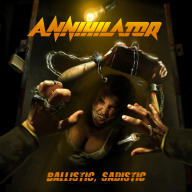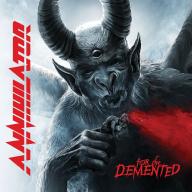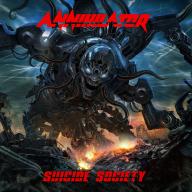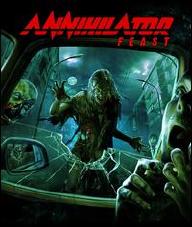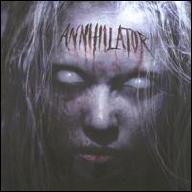Annihilator is the lifework of guitarist Jeff Waters, who founded the band in 1984 -- just as the speed metal revolution was getting underway further to the south in the San Francisco Bay Area. Due in large part to this geographical isolation, Annihilator as a band phased in and out of existence over the next few years, with only Waters as a constant factor, but when the driven guitarist's homemade demos finally made it into the hands of Roadrunner Records, the band's career was ready to begin.
Released to positively wild public and critical acclaim at the height of the thrash metal boom, Annihilator's 1989 debut, Alice in Hell, was an unqualified triumph and epitomized the state of the art in terms of a thinking man's thrash metal, but it was hardly a band effort. Indeed, though they are pictured on the sleeve alongside Waters (who wrote, produced, and played guitar and bass on the entire album), vocalist Randy Rampage (formerly bassist with legendary Vancouver hardcore band D.O.A.), drummer Ray Hartmann, bassist Wayne Darley, and second guitarist Anthony Greenham were little more than hired guns. Not surprisingly, both Rampage and Greenham were gone by the release of the following year's Never, Neverland (replaced by the equally improbably named Coburn Pharr and Dave Scott Davis, respectively), the beginning of a revolving-door policy that would elevate Annihilator's musician turnover to Spinal Tap heights.
In any event, though not quite as inspired as its predecessor, Never, Neverland did decent business and the band's latest lineup capitalized by touring relentlessly behind it. A three-year delay and more lineup changes preceded 1993's Set the World on Fire, however, and the album's shocking move to adopt more traditional metal and commercial hard rock sounds wound up alienating most of Annihilator's fans, sending their popularity into a tailspin. Roadrunner issued 1994's Bag of Tricks compilation and promptly dropped the band, which quickly resurfaced with a new deal and several albums on Music for Nations (1994's King of the Kill, 1996's Refresh the Demon, 1997's Remains) but never again enjoyed anything similar to their original success -- despite Waters' retreat to thrashier terrain.
Released in 1999, Criteria for a Black Widow reunited the guitarist with both Roadrunner and old singer Rampage, but subsequent albums like 2001's Carnival Diablos, 2003's Waking the Fury, and 2004's All for You marked a return to Annihilator's unpredictable musical about-faces and personal musical chairs. Waters returned with Annihilator's 11th studio album, Schizo Deluxe, in 2005 with vocals supplied by Dave Padden, who had previously worked on 2004's All for You. Padden continued as vocalist on the band's 12th release, 2007's Metal, on which Waters had assembled an all-star cast -- including In Flames' Jesper Strömblad, Trivium's Corey Beaulieu, and Anvil's Steve Kudlow -- to perform. Waters and Padden continued their partnership on 2010's self-titled release and returned once again in 2013 for Annihilator's 14th studio album, Feast.
Padden would leave the group the following year, allowing Waters to assume lead vocal duties on 2015's Suicide Society. The aptly named Triple Threat, a three-album set featuring a collection of Annihilator's classics performed acoustically, a recording of the group's 2016 Bang Your Head!!! Festival performance, and an accompanying video of the show, arrived in January 2017. In November of that year, Annihilator delivered their 16th studio release, For the Demented, which was co-produced by bassist Rich Gray, making it the first time Waters wasn't alone at the helm since 1990's Never, Neverland. 2020's Ballistic, Sadistic saw Waters take the reigns and deliver a blistering set that invoked the fiery spirit of the band's halcyon days, while 2022's Metal II offered up an overhaul of the group's star-studded 2007 release, with ex-Iced Earth singer Stu Block taking over for Dave Padden and Slayer's Dave Lombardo replacing Mike Mangini. ~ Eduardo Rivadavia, Rovi


